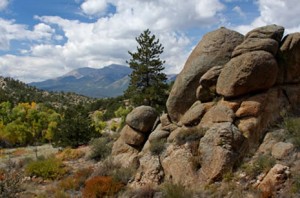By Ed Quillen
Before the sun came up on the morning of Oct. 1, I got into my pickup to drive to the Salida Café & Roastery (the establishment formerly known as Bongo Billy’s Salida Café) for breakfast followed by the monthly business meeting of the Salida Business Alliance (formerly known as the Salida Merchants Association). I’m not much of a businessman – especially since selling this magazine to Mike Rosso – but I was re-elected secretary of the SBA last winter, and it behooves me to attend meetings.
As I started the pickup, I looked down at the console between the front seats, and its cup-holder was gone.
It had been ripped off, but not ripped out. Nothing was broken or smashed. Whoever took it the night before had carefully removed the mounting screws. It seemed obvious that somebody needed that specific part, had seen the appropriate vehicle and found it unlocked, and away the cup-holder went. Apparently our mutt Bodie is not much of a watchdog, or maybe he did bark about the event and we slept right through it – the evening chill is such that we’ve closed the windows for the season.
This isn’t the first time that something has been stolen from a vehicle in front of my house. The stereo in my old Blazer disappeared one night a few years ago; it was a rather anemic unit with awkward controls, and so I really didn’t mind having an excuse to replace it.
That time, I reported it to the police, which was a waste of time for all parties concerned. This time around, I knew they weren’t going to collect fingerprints and issue an all-points bulletin for a 2000 Ford Ranger XLT with a fresh console cup-holder, so I didn’t bother the constabulary.
Both times, I felt as though I’d been punched in the stomach. Such thefts may be minor, but they make you feel violated in an almost intimate way.
And maybe there’s some karma involved. When I was in college 40 years ago, I somehow lost the cigarette lighter in my 1954 Chevrolet sedan, and acquired another from a 1954 Chevy that sat nearby in the parking lot of a 3.2 joint.
At any rate, this is not to bemoan a “crime wave” in Salida, for I don’t think there is one. The last time I checked the statistics, we were pretty close to average.
What I do want to bemoan is that there are no salvage yards left in Salida. Had this theft happened a few years ago, I could have driven a couple of miles to Colorado Auto Recycling and very likely have got the part for $10 or $15 and been good as new by that afternoon. I remember replacing a tail lamp that way on our Chevy Cavalier and a side window, and later a grille, on my Blazer.
We used to have two salvage yards, one on each side of town, and now we have none.
So I had to order the part from the local Ford dealer. To his credit, the parts guy there suggested a salvage yard in Cañon City. If I’d had other business in Cañon, it would have made sense. But a special trip involved too much time and gasoline for any savings that were involved
That’s one environmental advantage of a local salvage yard: It saves driving, thereby reducing gasoline consumption and carbon-dioxide production.
But wait, there’s more. The easier it is to get parts, the longer you can keep an older vehicle on the road, thereby reducing the need for new vehicles with the attendant mining and smelting of iron and copper, energy-consuming transportation of raw materials and finished cars, etc. If you’re concerned about resource depletion and carbon footprints, then salvage yards are a noble cause.
Moving from the environment to the economy, note that the local salvage yard keeps money in town where it can circulate further. It makes for jobs here, rather than somewhere else.
When you buy a new car, most of the money leaves town (especially if you don’t finance through a local lender).
For years, we drove a 1965 Dodge Dart. People gave me a hard time for driving an old clunker. I kept track of my spending on the car, and its “extra” costs (those on account of its age, as opposed to things all cars need like tires and wiper blades) were about $50 a month.
So I’d explain that my choice was this: 1) $50 a month to Pete Salerno to keep the old Dodge running, or 2) $300 a month, at least, to the bank for payments on a new car. Not only was the first option cheaper, but when there’s a choice between supporting a bank and a good local mechanic, Pete wins.
And in a crass commercial sense, the salvage yard can function something like an “anchor tenant” in a shopping mall. When we had our salvage yards, I’d run into friends from Breckenridge or Saguache who were in Salida to fetch car parts — and while in town, they’d do some other shopping, eat lunch, etc. Now Cañon City is picking up that trade from Salida.
Local salvage yards also make us more “self-sufficient” in a certain sense, in that we’re that much less reliant on outside sources at the other end of a long and intricate transportation system. Given this, and the economic and environmental benefits they offer, you could make the argument that they enhance our “sustainability.”
Now, “sustainability” is one of those buzzwords that I’m reluctant to promote, because I’m not sure whether “sustainability” is any different from “stagnation.” If I had to define a sustainable process, I’d say it’s one you can continue indefinitely under current conditions.
So organic agriculture is presumably sustainable for the next 4.5 billion years or so, until our sun goes rogue. And as long as there’s water. But note that every good farm has a junk pile.
Ditto for solar and wind energy, except those panels and collectors and turbines will need replacement parts from time to time, and thus the need for salvage yards, preferably local.
In other words, junk piles in some form or another are an essential component of sustainable activity.
Which brings me to local activism. We have Chaffee Citizens for Sustainability, active in fighting Nestlé, but with a broader mission “to support existing effective programs and initiate new programs and legislation that ensure the long-term viability and well-being of our community.”
I don’t know that an auto salvage yard is exactly a “new program” or “legislation,” but I hope I’ve made the case that a salvage yard would enhance the “well-being of our community.” So, how do we harness some of sustainability energy toward the return of a salvage yard? Or is that something that is just too uncool to care about?
Ed Quillen of Salida helped found Colorado Central in 1994. He maintains a non-commercial “computer salvage yard” in his cellar.


